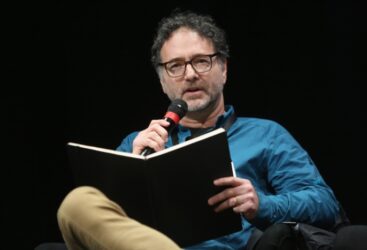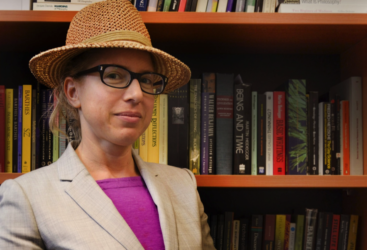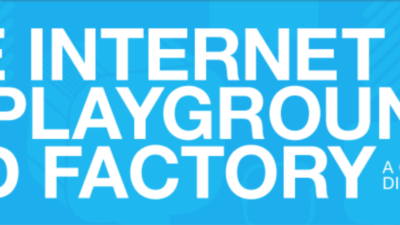The archive of the event website can be found here
An archive of the program for this event can be found here
Introduction
Today we are arguably in the midst of massive transformations in economy, labor, and life related to digital media. The purpose of this conference is to interrogate these dramatic shifts restructuring leisure, consumption, and production since the mid-century. In the 1950s television began to establish commonalities between suburbanites across the United States. Currently, communities that were previously sustained through national newspapers now started to bond over sitcoms. Increasingly people are leaving behind televisions sets in favor of communing with — and through– their computers. They blog, comment, procrastinate, refer, network, tease, tag, detag, remix, and upload and from all of this attention and all of their labor, corporations expropriate value. Guests in the virtual world Second Life even co-create the products and experiences, which they then consume. What is the nature of this interactive ‘labor’ and the new forms of digital sociality that it brings into being? What are we doing to ourselves?
Only a small fraction of the more than one billion Internet users create and add videos, photos, and mini-blog posts. The rest pay attention. They leave behind innumerable traces that speak to their interests, affiliations, likes and dislikes, and desires. Large corporations then profit from this interaction by collecting and selling this data. Social participation is the oil of the digital economy. Today, communication is a mode of social production facilitated by new capitalist imperatives and it has become increasingly difficult to distinguish between play, consumption and production, life and work, labor and non-labor.
The revenues of today’s social aggregators are promising but their speculative value exceeds billions of dollars. Capital manages to expropriate value from the commons; labor goes beyond the factory, all of society is put to work. Every aspect of life drives the digital economy: sexual desire, boredom, friendship — and all becomes fodder for speculative profit. We are living in a total labor society and the way in which we are commoditized, racialized, and engendered is profoundly and disturbingly normalized. The complex and troubling set of circumstances we now confront includes the collapse of the conventional opposition between waged and unwaged labor, and is characterized by multiple “tradeoffs” and “social costs”—such as government and corporate surveillance. While individual instances are certainly exploitative in the most overt sense, the shift in the overall paradigm moves us beyond the explanatory power of the Marxian interpretation of exploitation (which is of limited use here).
Free Software and similar practices have provided important alternatives to and critiques of traditional modes of intellectual property to date but user agency is not just a question of content ownership. Users should demand data portability, the right to pack up and leave the walled gardens of institutionalized labor à la Facebook or StudiVZ. We should ask which rights users have beyond their roles as consumers and citizens. Activists in Egypt have poached Facebook’s platform to get their political message out and to organize protests. Google’s Image Labeler transforms people’s endless desire for entertainment into work for the company. How much should Google pay them to tag an image? Such payment could easily become more of an insult than a remuneration. Currently, there are few adequate definitions of labor that fit the complex, hybrid realities of the digital economy.
This conference confronts the urgent need to interrogate what constitutes labor and value in the digital economy and it seeks to inspire proposals for action. Currently, there are few adequate definitions of labor that fit the complex, hybrid realities of the digital economy. The Internet as Playground and Factory poses a series of questions about the conundrums surrounding labor (and often the labor of love) in relation to our digital present:
- Is it possible to acknowledge the moments of ruthless exploitation while not eradicating optimism, inspiration, and the many instances of individual financial and political empowerment?
- What is labor and where is value produced?
- Are strategies of refusal an effective response to the expropriation of value from interacting users?
- How is the global crisis of capitalism linked to the speculative performances of the digital economy?
- What can we learn from the “cyber sweatshops” class-action lawsuit against AOL under the Fair Labor Standards Act in the early 1990s?
- How does this invisible interaction labor affect our bodies? What were key steps in the history of interaction design that managed to mobilize and structure the social participation of bodies and psyches in order to capture value?
- Most interaction labor, regardless whether it is driven by monetary motivations or not, is taking place on corporate platforms. Where does that leave hopeful projections of a future of non-market peer production?
– Trebor Scholz
The conference is sponsored by Eugene Lang College The New School for Liberal Arts and presented in cooperation with the Center for Transformative Media at Parsons The New School for Design, Yale Information Society Project, 16 Beaver Group, The New School for Social Research, The Change You Want To See, The Vera List Center for Art and Politics, New York University’s Council for Media and Culture, and n+1 Magazine.
Discussion on the list of the Institute for Distributed Creativity (IDC)
Join our list to take part in the conference discussion and to learn about future events, projects, and publications.
Participants
-

Jonathan Beller Professor of Humanities and Media Studies at Pratt Institute
-

Laura Forlano Writer and Design Researcher
-

Idil Abshir Journalist
-

Chris Barr Artist and Designer - Assistant professor in the Department of Art and Design at West Virginia University
-

Carolyn Lee Kane Assistant Professor of Visual Communications at Ryerson University, Toronto
-

Lilly Irani Assistant Professor of Communication & Science Studies at University of California, San Diego
